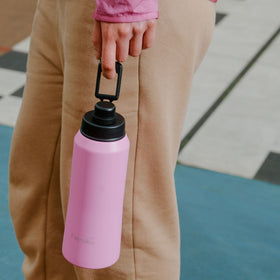
Silicones In Makeup and Skin Care: Should You Avoid Them?
A while back, I decided to stop stocking a 'natural' brand of skincare here at Hello Charlie because they reformulated and introduced silicones to their product formulations. I had lots of questions about why I don't like silicones, so I thought it was about time to explain that. What are silicones, and how do they affect your skin?
What are silicones?
A silicone is a large molecule made up of repeating chains of alternating oxygen and silicon atoms, along with carbon and hydrogen. Silicon is a mineral. Over 90% of the Earth’s crust is silicone – it’s the primary element in sand. Silicones are stable over a wide range of temperatures and have a generally low toxicity and chemical reactivity. They have a wide variety of applications, from the automotive and airline industries to cookware to personal care products. The silicone compounds used in skin care are interesting. They are water repellent but gas permeable, which means they allow air to pass through. Because of the way the materials are formed – big molecules connected together in a sort of lattice with a lot of space in between. They stay on the surface, forming a water resistant barrier that still allows the skin to breathe. For this reason they don't usually feel heavy or greasy.
Are silicones natural?
Can you still use silicones if you’re committed to natural skincare? They’re obviously not found in nature. (Although a silicone molecule with a carbon component might be known as an ‘organic compound’, that doesn’t mean it’s plant or animal derived.) Silicones are not included in any organic skincare products, since they’re not certified by Ecocert or any other organisation.
Are they toxic?
Silicones are generally regarded as safe, at least for application to the skin and hair. They’re considered hypoallergenic, non comedogenic, and non sensitising. However, there's a lot of anecdotal evidence that silicones can cause reactions for people with sensitive or acne prone skin, so you might want to be careful if you have this skin type.
Leaky silicone breast implants caused a lot of controversy a few years ago when they were implicated in cancer and autoimmune disorders. According to the U.S. FDA, recent research has found them generally safe, except for a very slight increase in the risk of anaplastic large cell lymphoma, a type of white blood cell cancer. But this isn't the same as putting them on your skin.
Silicones in makeup and skincare
Silicones are so popular because they add slip to cosmetic formulations, allowing them to glide on smoothly, giving the product a silky feel. In hair care products, they coat the cuticle, detangle and add shine. They also protect hair from heat. Silicones are also popular with manufacturers because they're cheap. Makeup primers use silicones to cover enlarged pores, minor wrinkles and scarring, creating a smooth finish as well as forming a base for foundation to stick to. A silicone-heavy foundation can give the skin the smooth and glowing look that is so on trend right now. Makeup settings sprays are usually chock-full of silicones, since silicones can form a protective barrier over your eye shadow and contouring artistry that keeps it all in place.
Some types of silicones actually increase the penetration of other substances in the product. This can be a problem if you’re sensitive to anything in the formula. If the products contains potentially irritating ingredients, such as hydroquinone (a skin bleaching compound), you can end up with a concentration of that substance underneath the silicone layer.
Who should avoid silicones?
Those with sensitive and acne prone skin should stay away. A good natural skincare product will treat your skin gently and nourish it rather than simply forming a layer over the top. Silicones provide a temporary smoothing effect, but they don’t actually help the skin heal on its own. One of the most worrying things about silicones for the environmentally aware person is that heavier silicones are not biodegradable. Siloxane D4 is currently being investigated over concerns of a toxic build up in the environment and may be banned in the future. Considering how much silicone we’re producing nowadays, all this is a real cause for concern. At least with organic skincare you don’t have to worry that your face wash is destroying the environment.
How can I recognise silicones in the products I buy?
The word ‘silicone’ is probably not going to show up on the ingredients list. It’s an umbrella term that refers to a variety of substances. In general, look for terms ending in ‘cone’, ‘conol or ‘siloxane’. Here are some examples:- Amodimethicone: often found in hair care products. It sticks to your hair, so it's a great conditioner but can build up over time.
- Cyclopentasiloxane: this is a water-based silicone that evaporates quickly. It adds slip to cosmetics and skin and hair care products so that they glide on smoothly.
- Dimethicone: a very heavy silicone, dimethicone is an efficient detangler and frizz buster. It doesn’t evaporate at all and will definitely build up over time without thorough cleansing.
- Dimethiconol: a very fluid silicone that acts as an anti-foaming agent. It also works as an emollient, plumping up fine lines and wrinkles.
- Dimethicone copolyol: works as an emulsifier, keeping the oil and water components from separating.
- Trimethylsilylamodimethicone: often used as a detangler in hair care products.
However, some silicones are sneaky:
- Polymethylsilsesquioxane: a resin that is often used in tiny little spheres that act as anti-caking and water-repelling agents.
In fact, if you’re in doubt about an ingredient in skin and hair care products or cosmetics, there’s a good chance it’s a silicone.
Which skincare products contain silicones?
Short answer: All of them can contain silicones. If it’s not an organic skincare line it probably contains silicones. These compounds do so many useful things and are generally safe for most people. Adding silicones gives products that cosmetically elegant texture that we’ve all come to know and love. You know – that silky light and fast drying, yet emollient, lotion that feels so pleasant as you spread it over your face. Or maybe it's the hair conditioner that provides instant detangling, or the serum that applies smoothly without foaming or pilling. As you move away from silicones towards natural and organic skincare you’ll find that the products may feel heavier or stickier than you’re used to. However, as silicone-free formulations improve this issue will only get better.
Silicone substitutes
Cosmetic and skincare companies are investing a lot into researching natural silicone replacements. Some substances to look for are:- dicaprylyl ether
- dicaprylyl carbonate
- coco-caprylate
- dicaprylyl ether
- decyl glucoside
- glyceryl oleate
Many others will become available as more people look for silicone free products. Silicones, while useful, don’t have any part in an organic lifestyle. With a little effort you can find natural skincare products that are just as good for your skin, but much better for the environment.
Looking for silicone free makeup? You can find a wide variety of natural makeup here at Hello Charlie.










